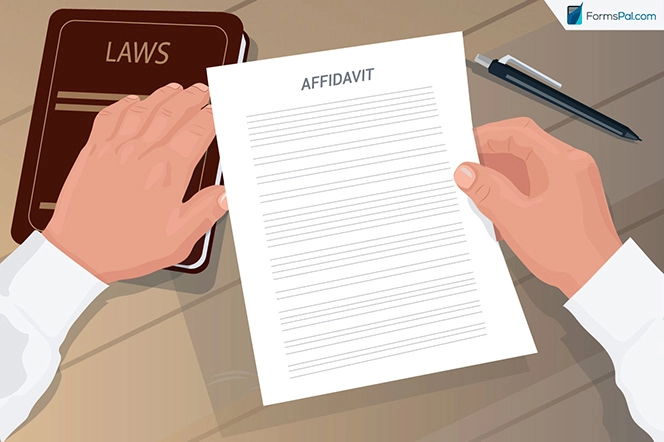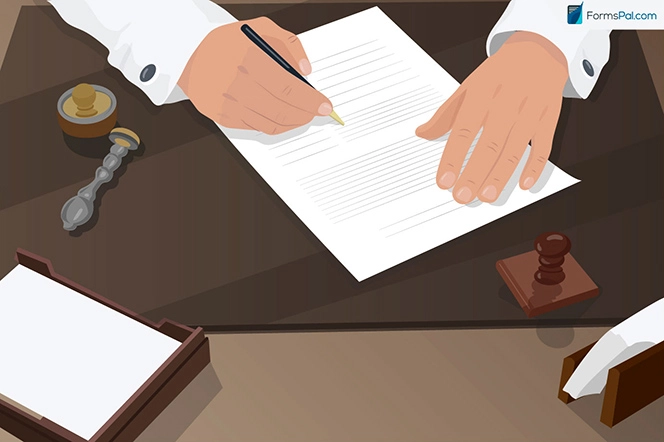What Is an Affidavit?
An affidavit is a document used to make a written statement confirmed by oath or affirmation by a notary or another authorized person.
The main purpose of such a document is to let a person make a statement claim that it is accurate. This person should understand that they will be legally punished if the statement is partly or entirely false. The punishment can be different and is generally picked by the court.
If appropriately validated, the document has the same effect as testification under oath. It is commonly used to obtain testimony from a witness who cannot physically appear for the court hearing.
An individual making a statement is referred to as the deponent or affiant. An affidavit is considered completed when the deponent signs it, and the document is notarized.
Types of Affidavits
There are many different types of affidavits depending on the kind of statement an affiant makes. For example, a financial affidavit is used to reveal an individual's financial situation in divorce cases.
One should use an affidavit of domicile when aiming at attesting the truthfulness of an individual's place of living, usually under oath. A small estate affidavit is a tool for beneficiaries to inherit real estate without going through a probate process.
There is also a specific type of affidavit called a self-proving affidavit. It is used by a testator when creating a will if they want to help beneficiaries avoid being challenged after the testator's death. Most of the states require this document to be witnessed by two adults and a notary.
Another specific type of affidavit is a counter-affidavit. It is used in situations where a court case is brought in a small claims court by a plaintiff to sue another party for money owed, and a defendant thinks that the plaintiff is the one who is in default for owing money. Such an affidavit usually requires paying a certain court fee.
When Might You Need an Affidavit?
It would make sense to use an affidavit in cases of:
-
making statements that are about to be filed with the court;
-
verifying residency or identity of an individual;
-
claiming property;
-
confirming the change of the name due to the evolution of marital status;
-
confirming not possessing stolen property or illegal drugs;
-
verifying death;
-
ensuring the ability to provide financial support etc.
Requirements for an Affidavit
First and foremost, an affidavit needs the affiant's signature. It is essential not to put their signature before they appear at the notary office.
Most of the cases require affidavits to be notarized. Along with a notary public, the powers of validating the document are also given to a clerk, attorney, or court judge. Who needs to sign an affidavit depends on the type of the document and the state where it was issued.
After the document is notarized, it should be filed with the local court clerk's office. A filing fee might be needed to process the affidavit.
However, in some cases, the affiant can go without notary acknowledgment. Only the affiant should sign an affidavit in such a case. The form should include a provision stating that the person will be punished for perjury if the document is not trustworthy. The penalty of perjury may consist of monetary fines, community service, and even jail, depending on the state. So, it’s not the safest option as a notary acknowledgment adds extra validity to the document.
How to Write an Affidavit in Four Simple Steps
Step 1. Choose the affidavit type you need

Among a wide variety of affidavit types, choose the one that fits your legal needs. Note that some affidavits require using a state-specific form. For example, to create an affidavit of support, Form I-864 should be used. If you need an affidavit of identity theft, the Internal Revenue Service website will be of help with Form 14039.
To make sure there are no issues regarding an affidavit form you are about to use, call or visit your local court's website to learn whether they provide affidavit templates online. Affidavit forms might be free, but sometimes you would need to pay a small fee to use them.
Then, decide whether you want to write the document on your own or use an affidavit template. For instance, a general affidavit such as an affidavit of residence doesn't require using a state-issued template, meaning you can benefit from our affidavit builder.
Step 2. Write down the facts

Speaking of witnessing affidavits, it is essential for a witness writing an affidavit to include only events that happened in real life and that they saw, said, or heard. It is possible to have information that isn't first-hand knowledge, but in such a case, an affidavit requires precise wording that this information is not first-hand.
Facts in an affidavit should be written using precise language. Vague statements that are hard to recall should be avoided from including in an affidavit. Opinionated descriptions of events are also frowned upon.
Please note that once the testimony is validated, it is impossible to change it.
Step 3. Check the document with an attorney

The first category of affidavits that needs the help of a lawyer is affidavit with the testimony of a witness. It is vital to seek legal assistance as a legal professional can help make any necessary edits or changes so the information is 100% accurate.
However, if an affidavit is made to verify the identity of a beneficiary or their residency, the deponent might go without an attorney's help.
Step 4. Validate the affidavit

When an affidavit has been appropriately crafted and reviewed by a legal advisor, a notary public should witness the moment of signing an affidavit. However, the notary's task here is only to certify the validity of the signature, not the truthfulness of the statements included in the affidavit. A notary acknowledged affidavit would have a notary's printed name and signature.
